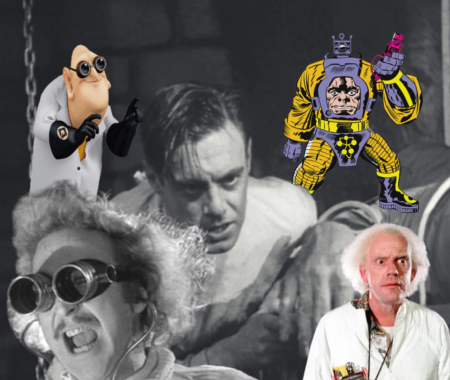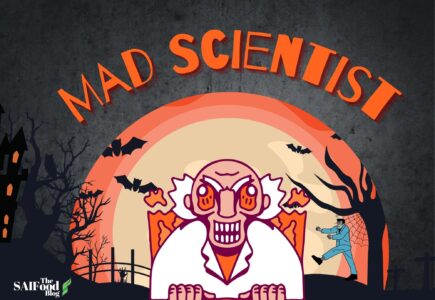An eerie evolution
It’s Halloween, a time when we welcome horror and stories that provoke fear into our lives. Oddly we celebrate stories of chainsaw murders, ghosts, monsters, witches, and thrillers that keep us on the edge of our seats. We also have an obsession with mad scientists, and their crazed experiments and evil motives. But why? Is it all inspired by Mary Shelley’s epic 1818 book Frankenstein, where Dr. Frankenstein electrocutes his ‘monster’ to life, which is made out of scraps of corpses? Is it that we have a deep distrust of science in general? Or is it merely that we have a curiosity to fantasize about the depths of where we can take science? Who knows, but it’s unlikely that our fictional mad scientists will stop being a protagonist on the big screen anytime soon.
The horror and madness that is science
 There are plenty of fictional characters in films and books that spring to mind when depicted as mad or crazed scientists. There is the mysterious Dr. Victor Frankenstein who is often portrayed as evil; the classic rendition of the crazed white hair of Gene Wilder in Young Frankenstein and the comically crazy Doc Brown in Back to the Future; recent kid’s blockbuster Despicable Me even has the mad Dr. Nefario which kids can recognize as having a few moral screws loose. When we look at these fictional characters, we have to consider that while they may fit into our stereotype of ‘mad’ scientists, are they really mad? Likely, they do not see themselves as mad rather, they are merely acting to solve a problem using science. It’s their values and perhaps the lack of ethics (or they’re ignoring them), which makes them appear mad.
There are plenty of fictional characters in films and books that spring to mind when depicted as mad or crazed scientists. There is the mysterious Dr. Victor Frankenstein who is often portrayed as evil; the classic rendition of the crazed white hair of Gene Wilder in Young Frankenstein and the comically crazy Doc Brown in Back to the Future; recent kid’s blockbuster Despicable Me even has the mad Dr. Nefario which kids can recognize as having a few moral screws loose. When we look at these fictional characters, we have to consider that while they may fit into our stereotype of ‘mad’ scientists, are they really mad? Likely, they do not see themselves as mad rather, they are merely acting to solve a problem using science. It’s their values and perhaps the lack of ethics (or they’re ignoring them), which makes them appear mad.
In regard to Dr. Frankenstein, Mary Shelley was writing at the time of early electricity experiments. In 1803, as part of a public exhibition about what electricity could do, an executed corpse was electrocuted, which appeared to reanimate the body. Sadly, this public experiment, which today would be ethically wrong and prohibited, was viewed as a scientific discovery. From this observation of reanimation, the scientists demonstrated the power of electricity and our own natural ‘current’ in the nervous system. Today this indeed sounds mad, but at this time, it led to a further understanding of electricity, medicine, and our nervous system. Not only have we advanced our scientific knowledge and insights, but we have also advanced experiment ethics and research is now conducted with methodologies and standard operating procedures that meet far higher standards than that of the 19th century.
Discovery and values
Science is all about discovery. It has led to numerous innovations and it has also been manipulated for less honourable actions. While Oppenheimer successfully developed the first nuclear weapon, afterwards he regretted that it had to be used to end World War II. The science that led to nuclear weapons was not built out of madness, it was the 1938 discovery of nuclear fission, in which scientists discovered that it was possible to split the nucleus of an atom. It was this discovery that led to nuclear weapons, as well as a reliable power source. In WWII, the values of ending the war were greater than the implications of what nuclear warfare could cause to society. Post-WWII, the world’s governments agreed that weapons of mass destruction needed to be highly regulated, with a treaty being signed to prevent a nuclear conflict. This ‘Non-Proliferation of Nuclear Weapons’ Treaty promotes the science of nuclear fission and energy but opposes its use as a weapon.
The values we hold as a society are often reflected in the policies and regulations that we enforce. The depiction of ‘mad’ scientists as the protagonists of our media and fiction is merely for our entertainment. When it comes to scientific discovery, we’re not seeing scientific research within medicine, drugs, food, energy, etc., taking actions which leave us questioning our morality. Looking at the recent discoveries of COVID-19 vaccines, we saw this research transpire at an accelerated pace, yet it did not circumvent our regulations or ethics. Instead, it showed that when we have a collective problem, a global effort can be successful in terms of investing in the solution. However, recent medical research has raised ethical problems, specifically when a Chinese scientist used gene editing on human embryos, with no consent or approval. This scientist was found guilty of violating standard medical practices and sentenced to 3 years in prison. The unknowns and ethics around stem cell research are highly scrutinized, and currently, universal standards are being developed to advance science and protect our values.
The madness of regulation and perception
It’s not likely that ‘mad’ scientists are going away, it’s now part of our pop culture. In the world of fiction, it’s easy to be sold on storylines of mad science and get swept away in all that we don’t know or fully trust. But this leads to questions of whether we should be depicting our scientists in this light? Or should it be that this ‘madness’ is projected upon those that are blocking the discovery of new products and processes, as well as the acceptance of science? There is nothing wrong with questioning science, science should be questioned, it helps to refine ideas and applications, allowing us to better understand and trust it. But it is maddening that after science continues to answer the questions and doubts, the results are not accepted. Why question science if you don’t want to know, or accept the answers? To those that are science literate and trusting of scientific procedures and policies, it’s maddening that doubts and questions are repeatedly imposed on science. Is it not ‘mad’ that we oppose science and regulation of innovations that could reduce diseases, improve the nutrition of food, feed the hungry, or reduce greenhouse emissions?


Pingback: From Mad Scientists to Maddening Science Perceptions – Knowledge of world